CloudVPN Review: Quick Expert Summary
CloudVPN is a below-average VPN service, and there are much better alternatives on the market, like ExpressVPN.
CloudVPN comes with industry-standard VPN security features like a kill switch, 256-bit AES encryption, and a no-logs policy, it has good speeds on nearby servers, and it allows torrenting on all servers. That said, CloudVPN leaked my DNS data 70% of the time in my leak tests, meaning my browsing was exposed.
In addition, CloudVPN doesn’t work with top sites like Netflix and Disney+, has slow streaming speeds for less-popular streaming sites (like YouTube) on distant servers, and its server network is pretty small. Its apps are also buggy, its customer support is terrible, and there’s no money-back guarantee.
CloudVPN allows 6 simultaneous connections and has paid monthly and yearly plans.
| 🏅 Overall Rank | #68 out of 82 VPNs |
| 🌍 Number of Servers | 95 |
| 📱 Number of Devices | 6 |
| 💸 Starting Price | $4.16 / month |
| 🎁 Free Plan | ❌ |
| 💰 Money-Back Guarantee | ❌ |
CloudVPN Full Review — Nothing Special (& Leaks Your DNS Data)
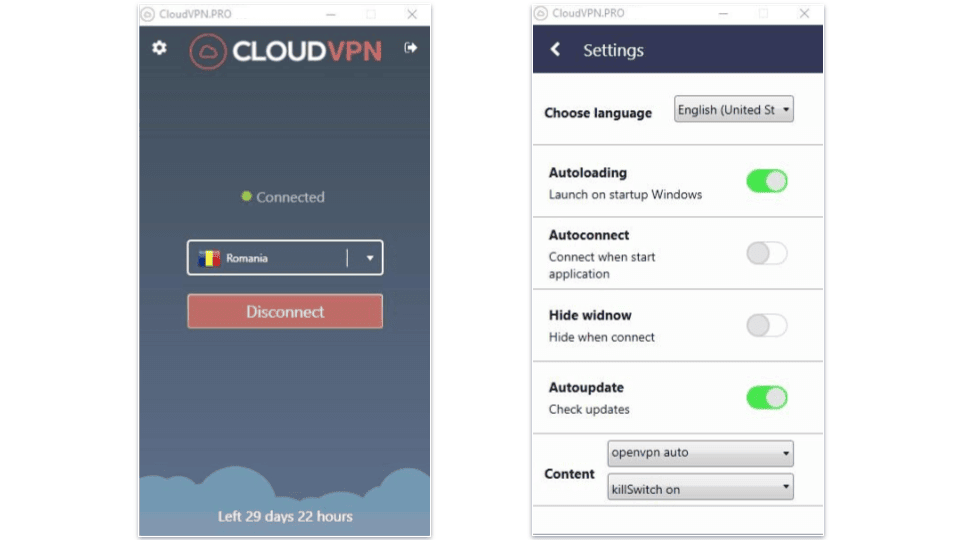
I spent the past few weeks testing and researching CloudVPN to see how it compares to other top VPNs, and my conclusion is that other than having some essential security features and decent speeds, there’s nothing special or even good about it.
What I hate the most about this VPN is that it leaks your DNS data while you’re connected to many of its servers. That makes using this VPN completely pointless, as a DNS leak allows your internet service provider (ISP) to monitor what sites you browse.
Other issues include outdated support guides, glitchy apps, and not working with sites like Netflix and Amazon Prime. Other top VPNs like ExpressVPN and Private Internet Access provide significantly better security, apps, streaming support, and more.
CloudVPN Plans & Pricing — Affordable but Not a Great Value
CloudVPN has paid monthly and yearly plans. It allows 6 simultaneous connections, which is on the lower end of the industry average of 5–10 connections.
CloudVPN’s prices, which start at $4.16 / month, are affordable but still higher than a lot of competitors like Private Internet Access, CyberGhost VPN, NordVPN, and Surfshark. And while ExpressVPN is more expensive than CloudVPN, it provides much better value.
CloudVPN accepts multiple payment methods including credit/debit cards, cryptocurrencies, Paymentwall, Google Pay, Apple Pay, and more. But I’m disappointed how CloudVPN doesn’t come with a money-back guarantee — most top VPNs provide a 30-day money-back guarantee (and CyberGhost VPN has a 45-day money-back guarantee for its long-term plans). It does offer a 24-hour free trial to test the product, but I’d feel much safer if I had more time to see if it suits my needs.
CloudVPN Features — Subpar (Insufficient Info & Data Leaks)
CloudVPN comes with the following industry-standard VPN security features:
- 256-bit AES encryption — CloudVPN uses military-grade encryption to make your traffic unreadable (but if your DNS data leaks, as it did in my tests, this makes the encryption pretty much useless).
- No-logs policy — CloudVPN says it doesn’t collect your IP address or traffic (visited sites and downloaded files).
- Kill switch — This feature disables internet access if your VPN connection drops to protect you from traffic leaks (but again, if your DNS data is going to leak anyway, why even have a kill switch?).
CloudVPN says it uses the OpenVPN and IPSec protocols, but IPSec could mean either L2TP/IPSec or IKEv2/IPSec. I asked the customer support reps for clarification, but I never received a reply. The good news is that both protocols that use IPSec are pretty secure. Either way, I would like to see WireGuard added as an option since it’s just as secure as OpenVPN but much faster, and most top VPNs like ExpressVPN and Private Internet Access provide support for it.
CloudVPN doesn’t mention if it provides protection against IPv6, DNS, and WebRTC leaks (and the support reps didn’t reply to my questions about this). I ran several leak tests while connected to servers in 10+ countries — unfortunately, CloudVPN leaked my data in several tests, meaning my ISP could see my browsing even though I was connected to a VPN. Top competitors like ExpressVPN and Private Internet Access provide full leak protection to protect your browsing.
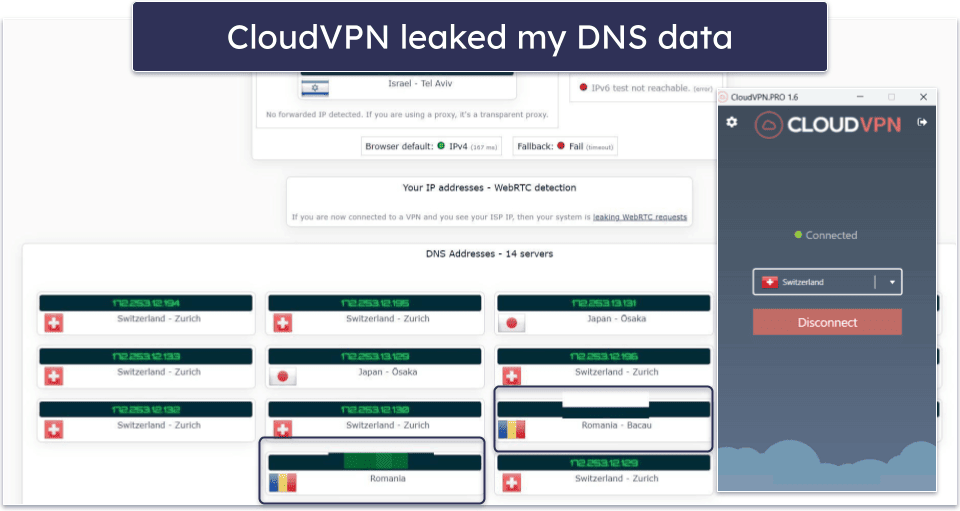
CloudVPN claims to provide access to a double VPN feature, which is supposed to send your data through 2 VPN servers instead of 1 VPN server to provide more security. That said, I haven’t seen this feature in any of CloudVPN’s apps. I asked the support reps about it, but they didn’t reply — notice a pattern of unresponsiveness here from customer support? If you’re looking for a good double VPN, I recommend checking out NordVPN, which routes your traffic through 2 servers, or Proton VPN whose Secure Core feature sends your traffic through 1 regular server and 1 server in a very secure location.
CloudVPN also doesn’t have extra features like split-tunneling or an ad blocker. And it doesn’t say if it has advanced security features like perfect forward secrecy or RAM-only servers — I asked the support reps about this, but they didn’t reply (to be honest, I don’t expect a VPN that leaks DNS data to have such features).
CloudVPN Privacy & Security — Decent No-Logs Policy (But No Independent Audit)
CloudVPN has a no-logs policy and doesn’t log your IP address or browsing traffic (the sites you visit and the files you download). However, I don’t like that CloudVPN’s privacy policy says the VPN monitors the sites visited by all of its users. CloudVPN claims it doesn’t tie website visits to specific users, so this shouldn’t be a serious concern. While the transparency is welcomed, there’s no proof to back up CloudVPN’s claims, as its no-logs policy hasn’t undergone an independent audit like ExpressVPN and Private Internet Access.
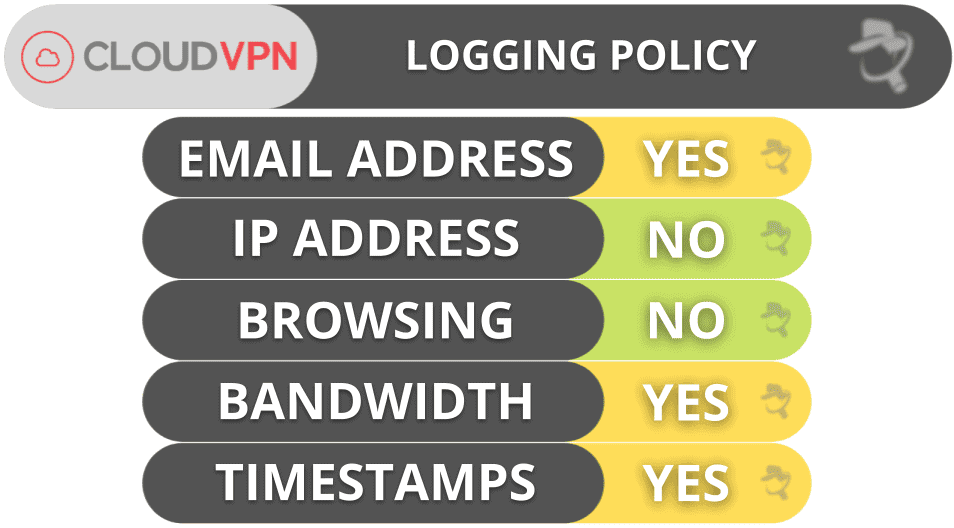
CloudVPN is headquartered in Belize (a country in Central America), which is outside the jurisdiction of the 5/9/14 Eyes Alliances (a group of countries that share surveillance data with each other). But a major red flag is how CloudVPN says it will share user data with government authorities if necessary.
Overall, CloudVPN has a no-logs policy, but many other top VPNs provide much better privacy because their no-logs policies have passed independent security audits.
CloudVPN Speed & Performance — Good on Local Servers, Slow on Distant Ones
I ran speed tests on my Windows PC while connected to a server in all 20+ countries where CloudVPN has a server. I had good speeds on servers in my country (Romania), but I experienced noticeable slowdowns while streaming on distant servers in the US, Canada, Japan, and India.
First, I ran a speed test without being connected to the VPN to see how fast my local network is:
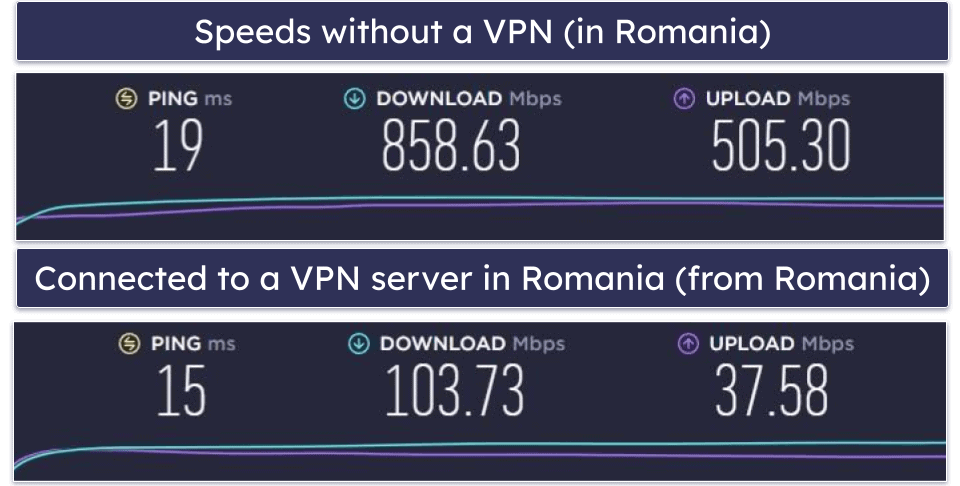
Next, I used CloudVPN’s quick-connect feature (Fastest), which automatically connected me to the fastest server for my location (a server in Romania).
Then, I connected to a distant server in the US — these are my speeds:

On local servers in Romania, I maintained pretty good speeds — sites loaded instantly, HD and 4K videos loaded instantly (but I experienced minor buffering while skipping through 4K videos), and I downloaded a 12 GB file in just 10 minutes, which is very fast.
On distant servers in the US, websites still loaded instantly, but I experienced big slowdowns while streaming — HD videos took 2–3 seconds to load and there was minor buffering at the start, and 4K videos loaded in 5–6 seconds and I experienced quality drops and long buffering times (8–10 seconds) while skipping through them.
Overall, CloudVPN provided me with good speeds on local servers, but I experienced noticeable slowdowns on distant servers while watching videos. If you’re looking for the fastest VPNs out there, check out ExpressVPN and Private Internet Access.
CloudVPN Servers & IP Addresses — Small Server Network (& Inaccurate Information Provided)
CloudVPN claims to have 95 servers in 41 countries on its website, but that’s not accurate because I counted the server locations in CloudVPN’s apps and there are only 20+ countries. Top competitors provide accurate server network information and have much larger networks — for example, ExpressVPN has servers in 105 countries and Private Internet Access has servers in 91 countries. CloudVPN mostly has servers in Europe, North America, and Asia, so users in other parts of the world will have a hard time finding nearby servers to get fast speeds.
CloudVPN says only some of its servers allow P2P traffic but doesn’t say which ones (and customer support is nonexistent to get more information). I downloaded torrents on a server in each country and never experienced any issues. That said, you still only get P2P servers in 20+ countries. Other P2P VPNs provide much better torrenting support — Private Internet Access, for instance, allows torrenting on all servers in 91 countries.
CloudVPN displays the server latency, which represents how long it takes for your device to communicate with the VPN server — this metric is helpful because it helps you find fast servers. CloudVPN also color-codes the server latency (green is good, and red is bad). In my tests, servers with low latency always provided me with the fastest speeds.
Overall, CloudVPN has a pretty small server network and doesn’t provide accurate info about it. Pretty much all the other top VPNs in 2024 provide access to accurate and larger server networks.
CloudVPN Streaming & Torrenting — Terrible for Streaming & Unsafe for Torrenting
CloudVPN is terrible for streaming — it works with Max, but it’s not compatible with other top sites like Netflix, Amazon Prime, and Disney+. Also, it doesn’t work with BBC iPlayer since it doesn’t have a server in the UK.
If you’re looking for a top streaming VPN, I’d go with ExpressVPN — it consistently works with Netflix, Amazon Prime, Disney+, and BBC iPlayer, and it’s also compatible with 100+ other streaming apps.
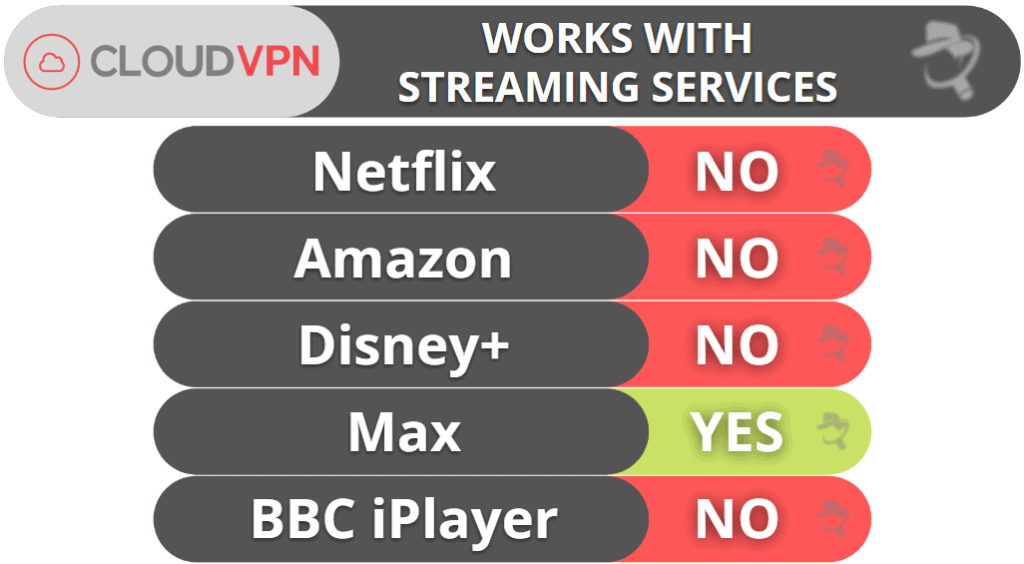
I also don’t recommend using CloudVPN for torrenting. While it works with popular P2P apps like uTorrent and qBittorrent, it only has P2P servers in 20+ countries and it leaks DNS data (meaning your ISP can see which P2P sites you’re accessing). There are significantly better P2P VPNs out there — for example, Private Internet Access supports P2P traffic on all servers, provides full leak protection, and also comes with port forwarding (lets you connect to more peers to get faster downloads).
Overall, CloudVPN doesn’t work with most top streaming sites (it only works with Max). Also, it’s not safe to use for torrenting because it suffers DNS leaks.
CloudVPN Ease of Use: Mobile & Desktop Apps — Simple to Navigate but Buggy
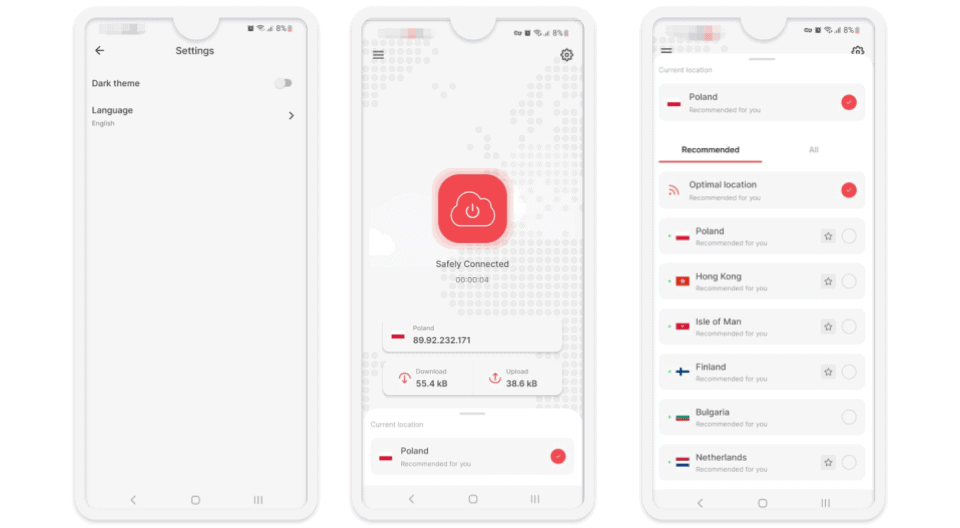
CloudVPN only has apps for Android, iOS, macOS, and Windows. If you’re looking for a VPN that covers more devices, I recommend ExpressVPN.
I tested CloudVPN’s Android app and it’s pretty easy to navigate. What I don’t like is that it’s very bare-bones — you don’t get any of the connection features that come with the desktop apps, like an auto-connect option, and there’s no kill switch. Also, the app is buggy because it sometimes can’t connect to random servers.
I also tested CloudVPN’s desktop app on my WIndows 11 PC and I wasn’t impressed. Like the Android app, it also has issues connecting to random servers sometimes.
Overall, CloudVPN’s apps are simple to navigate, but they’re buggy. All the top VPNs in 2024 have significantly better desktop and mobile apps.
CloudVPN Customer Support — Outdated Online Info & Terrible Email Support
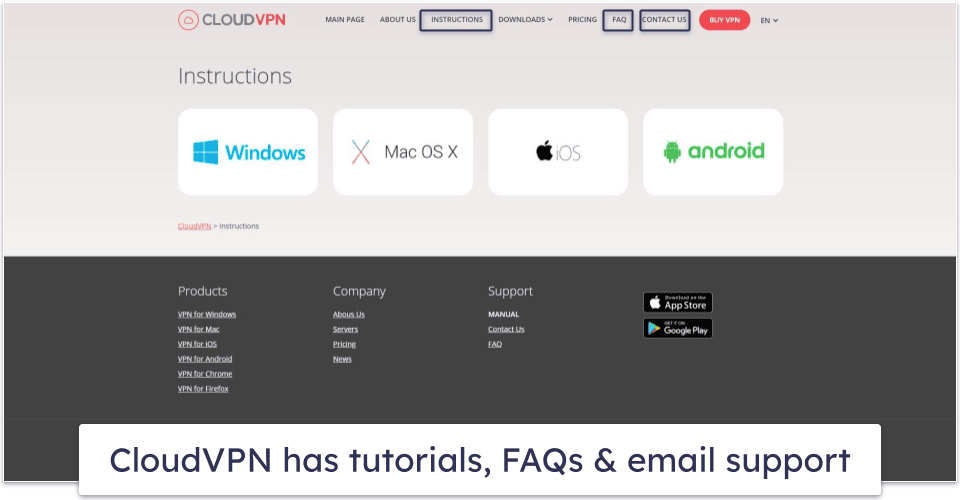
CloudVPN provides setup tutorials, frequently asked questions (FAQs), and email support, but its customer support is very unhelpful.
CloudVPN only has 4 outdated tutorials for major devices (most other VPNs have 10+ device guides) and some of the FAQs are inaccurate. For instance, one FAQ wrongly states the VPN has servers in 41 countries when it’s actually 20+.
Unlike other top VPNs such as ExpressVPN and CyberGhost VPN, CloudVPN doesn’t provide live chat support. So I tested its email support instead by sending multiple messages at random times of the day. Unfortunately, CloudVPN’s support reps never got back to me.
Overall, CloudVPN has outdated setup guides and FAQs, and its email support is extremely unresponsive.
Is CloudVPN Actually Any Good in 2024?
I recommend avoiding CloudVPN because it’s not a good VPN service — there are significantly better VPNs out there in 2024 like ExpressVPN and Private Internet Access.
While CloudVPN comes with industry-standard security features (256-bit AES encryption, kill switch, no-logs policy), good speeds on nearby servers, and P2P support on all servers, it suffers DNS leaks (meaning your ISP can see your browsing).
What’s more, CloudVPN doesn’t work with popular streaming services like Netflix and Disney+, has pretty slow streaming speeds on distant servers, and its server network is too small compared to top competitors. Plus, CloudVPN has glitchy apps, really bad customer support, and doesn’t provide a money-back guarantee.
CloudVPN allows 6 simultaneous connections and has paid monthly and yearly plans.
Frequently Asked Questions
Is CloudVPN safe to use?
No — it has bank-grade encryption, a no-logs policy, and a kill switch, but I can’t recommend using CloudVPN because it leaks DNS data. So your ISP can see what sites you access even though you’re using a VPN.
If you’re looking for a very secure VPN, I’d go with ExpressVPN because it comes with all essential VPN security features, has advanced security features like full leak protection, RAM-only servers, and perfect forward secrecy, provides a feature that blocks trackers and malicious sites, and includes a free password manager.
Does CloudVPN work on iOS and Android?
Yes — CloudVPN has an iOS app and an Android app, but the Android app is not available on Google Play (so you need to manually install it using an .apk file, which is inconvenient). I don’t like CloudVPN’s mobile apps because they’re glitchy, bare-bones, and have many typos.
If you need a really good iOS and Android VPN, I recommend ExpressVPN — both its iOS and Android apps work very well, and you get high-end security features.
Is CloudVPN good for torrenting?
No — it works with popular P2P apps like uTorrent and qBittorrent, but it only allows torrenting on servers in 20+ countries (so it’s difficult to find a nearby server for fast downloads) and leaks DNS data (so your ISP can see which P2P sites you access).
I think the best torrenting VPN is ExpressVPN because it allows P2P traffic on servers in 105 countries, provides high-end security features (including full leak protection and a feature that can block malicious P2P sites), and has blazing-fast download speeds.
Does CloudVPN work with Netflix?
No, CloudVPN doesn’t work with Netflix. It’s also not compatible with Amazon Prime, Disney+, and BBC iPlayer (it only works with Max).

